Leadership Management
Added on 2023-04-23
32 Pages7925 Words315 Views
Running head: LEADERSHIP MANAGEMENT
Leadership Management
Name of the Student
Name of the University
Author Note
Leadership Management
Name of the Student
Name of the University
Author Note
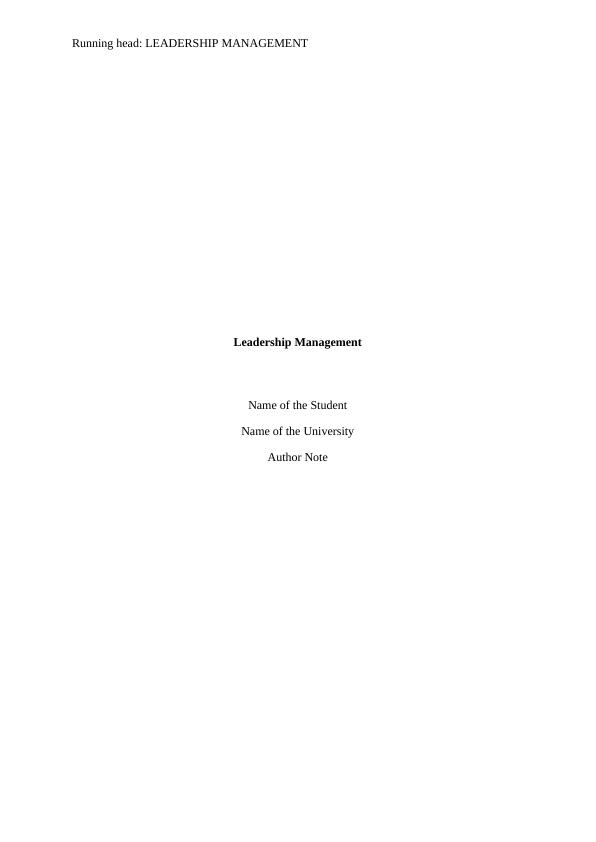
1LEADERSHIP MANAGEMENT
Contents
1. Introduction.........................................................................................................................2
2. Leadership Philosophy...........................................................................................................3
3. Leadership styles and Strategies............................................................................................5
4. Leadership Competencies......................................................................................................8
Results of self assessment tools:............................................................................................9
5. Leadership Experience.........................................................................................................11
Leadership Experiences to date:...........................................................................................11
Team Building Activity (professional skills development experience)...............................11
Presentation and Seminars...................................................................................................11
Managing Organizational Performance:..............................................................................12
Community Service Activity:..............................................................................................12
6. Working with and Leading Teams.......................................................................................14
7. Leadership Development and Action Plan...........................................................................17
Objective1: Developing focus on work:..............................................................................17
Objective 2: Developing strategic thinking ability..............................................................17
Objective 3: Developing negotiation skills..........................................................................18
Objective 4: Developing teamwork.....................................................................................18
8. Summary..............................................................................................................................20
References:...............................................................................................................................21
Contents
1. Introduction.........................................................................................................................2
2. Leadership Philosophy...........................................................................................................3
3. Leadership styles and Strategies............................................................................................5
4. Leadership Competencies......................................................................................................8
Results of self assessment tools:............................................................................................9
5. Leadership Experience.........................................................................................................11
Leadership Experiences to date:...........................................................................................11
Team Building Activity (professional skills development experience)...............................11
Presentation and Seminars...................................................................................................11
Managing Organizational Performance:..............................................................................12
Community Service Activity:..............................................................................................12
6. Working with and Leading Teams.......................................................................................14
7. Leadership Development and Action Plan...........................................................................17
Objective1: Developing focus on work:..............................................................................17
Objective 2: Developing strategic thinking ability..............................................................17
Objective 3: Developing negotiation skills..........................................................................18
Objective 4: Developing teamwork.....................................................................................18
8. Summary..............................................................................................................................20
References:...............................................................................................................................21
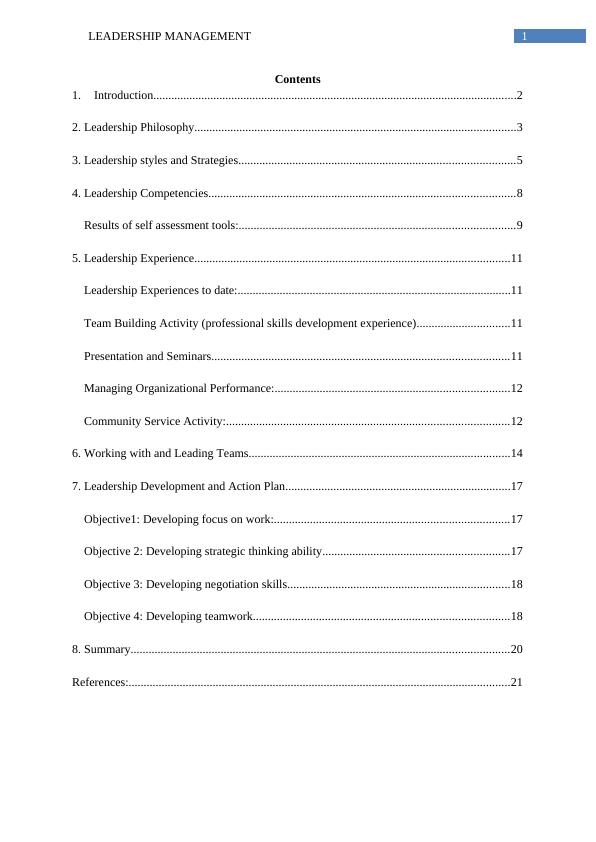
2LEADERSHIP MANAGEMENT
1. Introduction
I am a veteran nurse with 25 years of professional experience in acute care and critical
care nursing. Currently I am working in a large private hospital with nursing staff strength on
200 registered nurses. I possess a strong aptitude for management and mentoring and have
undergone lean management training programs. I strongly believe that by proper nurturing
and training of the nurses, their skills and competencies can be enhanced and thus the quality
of care in the hospital can be improved. I have been actively engaged in managing a group of
nurses and have received the award of being one of the best nursing leaders in the
organization. My responsibilities also included conducting pandemic drills, developing
improvement programs, succession planning and grooming young leaders (Grille & Kauffeld,
2015).
I have also won several other awards and accolades due to my professional
competency such as the individual group CEO service award, best nurse leadership
development award, team performance excellence awards, service quality excellence award,
best quality improvement award, professional development award, best mentor award and
multiple customer satisfaction awards (Mishra, 2017).
My career goal is to achieve further success and professional growth in my field, take
on more roles and responsibilities in the administrative duties in the hospital and through my
hard work and professional competency, earn a promotion as the hospital’s chief
administrator (Chen, 2017).
1. Introduction
I am a veteran nurse with 25 years of professional experience in acute care and critical
care nursing. Currently I am working in a large private hospital with nursing staff strength on
200 registered nurses. I possess a strong aptitude for management and mentoring and have
undergone lean management training programs. I strongly believe that by proper nurturing
and training of the nurses, their skills and competencies can be enhanced and thus the quality
of care in the hospital can be improved. I have been actively engaged in managing a group of
nurses and have received the award of being one of the best nursing leaders in the
organization. My responsibilities also included conducting pandemic drills, developing
improvement programs, succession planning and grooming young leaders (Grille & Kauffeld,
2015).
I have also won several other awards and accolades due to my professional
competency such as the individual group CEO service award, best nurse leadership
development award, team performance excellence awards, service quality excellence award,
best quality improvement award, professional development award, best mentor award and
multiple customer satisfaction awards (Mishra, 2017).
My career goal is to achieve further success and professional growth in my field, take
on more roles and responsibilities in the administrative duties in the hospital and through my
hard work and professional competency, earn a promotion as the hospital’s chief
administrator (Chen, 2017).
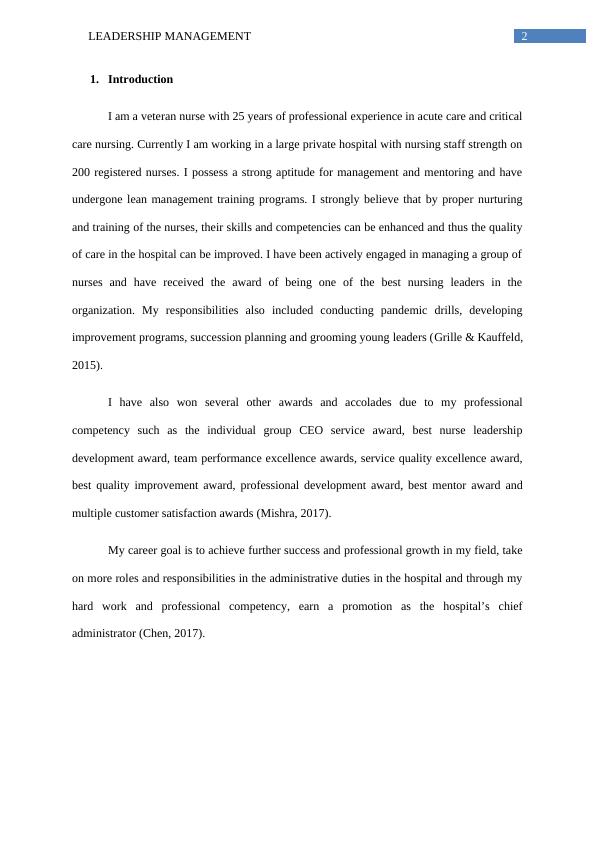
3LEADERSHIP MANAGEMENT
2. Leadership Philosophy
According to Hargett et al. (2017), leadership is an ability which allows an individual
to lead and guide people and organizations, provide them a vision of the future towards which
they can work to, inspire them to achieve success and facilitate their work by developing their
skills, competencies and improving access to necessary resources. I believe that the ability to
motivate and guide people are vital leadership skills that can help leaders to effectively lead
people towards a common goal or objective. Venkatesh (2016) points out that in a business
environment; effective leadership is also integrally related to organizational performance.
Therefore the ability to foster maintenance and improvement of organizational performance
is also an import leadership skill as well (Denis & van Gestel, 2016).
In order to lead people in an effective and efficient manner, leaders must possess
some vital qualities which can separate a good leader from a bad one (Weech-Maldonado et
al., 2018). According to to Hargett et al. (2017) and Venkatesh (2016) some of the most
important leadership qualities can include integrity and honesty, confidence, patience, ability
to inspire others, passionate and commitment towards a cause, strong in communication,
decisiveness, accountability, empowerment, creativity and innovativeness as well as
empathy. Additionally, Van Hala et al. (2018) also added that in order to effectively lead an
organization, a leader should also should have strong critical thinking, analytical, problem
solving, strategic planning and conflict management skills.
I believe that I am a confident, honest, motivated and creative person having a strong
emotional intelligence and managerial aptitudes. However I also believe that in order to
further develop my competencies as a leader, I need to emulate some vital leadership
qualities such as decisiveness, patience and conflict management. I believe that by
2. Leadership Philosophy
According to Hargett et al. (2017), leadership is an ability which allows an individual
to lead and guide people and organizations, provide them a vision of the future towards which
they can work to, inspire them to achieve success and facilitate their work by developing their
skills, competencies and improving access to necessary resources. I believe that the ability to
motivate and guide people are vital leadership skills that can help leaders to effectively lead
people towards a common goal or objective. Venkatesh (2016) points out that in a business
environment; effective leadership is also integrally related to organizational performance.
Therefore the ability to foster maintenance and improvement of organizational performance
is also an import leadership skill as well (Denis & van Gestel, 2016).
In order to lead people in an effective and efficient manner, leaders must possess
some vital qualities which can separate a good leader from a bad one (Weech-Maldonado et
al., 2018). According to to Hargett et al. (2017) and Venkatesh (2016) some of the most
important leadership qualities can include integrity and honesty, confidence, patience, ability
to inspire others, passionate and commitment towards a cause, strong in communication,
decisiveness, accountability, empowerment, creativity and innovativeness as well as
empathy. Additionally, Van Hala et al. (2018) also added that in order to effectively lead an
organization, a leader should also should have strong critical thinking, analytical, problem
solving, strategic planning and conflict management skills.
I believe that I am a confident, honest, motivated and creative person having a strong
emotional intelligence and managerial aptitudes. However I also believe that in order to
further develop my competencies as a leader, I need to emulate some vital leadership
qualities such as decisiveness, patience and conflict management. I believe that by
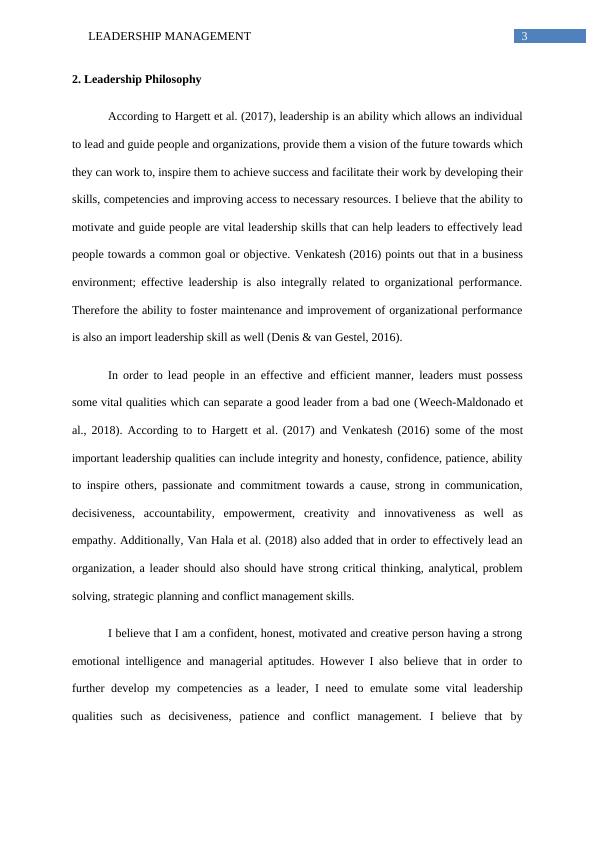
4LEADERSHIP MANAGEMENT
developing these qualities, I would be able to make decisions faster and easier, become more
patient in my work and resolve workplace conflicts in a more effective manner.
My Leadership Philosophy is to be always consistent and fair in my principles and
values that guide my decisions. I have also made it a point to spend a significant amount of
time listening to people and their feedbacks while making decisions that can affect them. I
also value honesty, accountability and transparency, which I try to maintain in my work and
also instill those values among others. I am also always curious about acquiring new
knowledge that can help me to guide and lead people in a better manner. I respect cultural
diversity in the organization and individuality of each member of the team which helps me
identify their individual strengths and how they can contribute to team performance. I also
like to inspire others through my own performance, leading by examples that others can
follow (Du Plessis et al., 2016).
developing these qualities, I would be able to make decisions faster and easier, become more
patient in my work and resolve workplace conflicts in a more effective manner.
My Leadership Philosophy is to be always consistent and fair in my principles and
values that guide my decisions. I have also made it a point to spend a significant amount of
time listening to people and their feedbacks while making decisions that can affect them. I
also value honesty, accountability and transparency, which I try to maintain in my work and
also instill those values among others. I am also always curious about acquiring new
knowledge that can help me to guide and lead people in a better manner. I respect cultural
diversity in the organization and individuality of each member of the team which helps me
identify their individual strengths and how they can contribute to team performance. I also
like to inspire others through my own performance, leading by examples that others can
follow (Du Plessis et al., 2016).
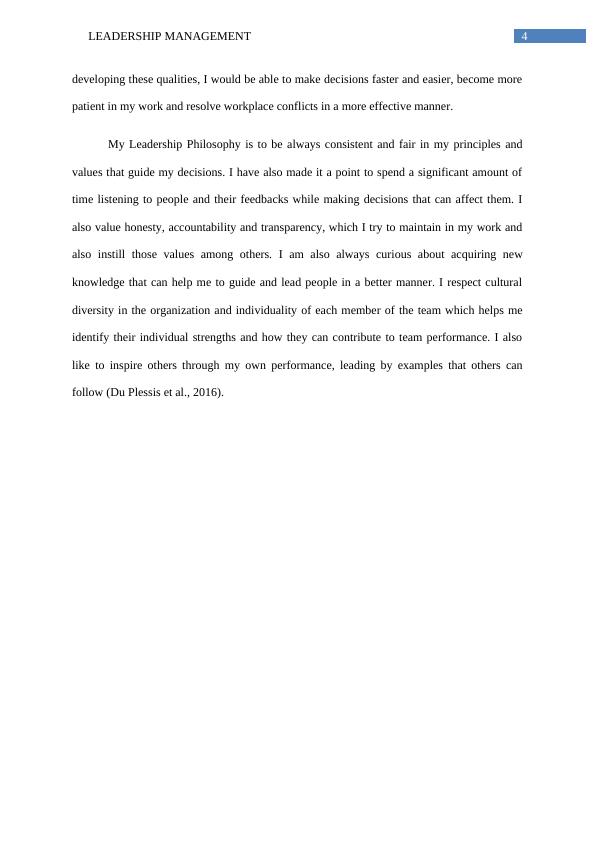
5LEADERSHIP MANAGEMENT
3. Leadership styles and Strategies
The leadership style that I personally prefer is a democratic or participative
leadership style. This form of leadership provides importance to the views and opinions of
the followers or members of the team and involve them in the decision making process. The
democratic leaders provide guidance to the members as well as foster their engagement in the
organization (Lumbasi et al., 2016). According to Asmawi et al. (2015) democratic leaders
can help to effectively motivate the followers, give them a sense of importance as a member
of the team or organization and foster their commitment towards organizational or team
objectives as well as help to overcome resistance to change in the organization. I also believe
that a relationship oriented leadership style is an important aspect which can help to
develop effective interactions with the followers and motivate as well as inspire them to
achieve the organizational goals by developing effective professional relationship with them
(Ehrhart, 2015). According to Savelsbergh et al. (2015), a relationship oriented leadership is
developed upon effective communication between the leader and followers and a strong
interpersonal relation which fosters a two way sharing of ideas, opinions and feedback. A
leader with strong relations with the followers is more likely to be respected and followed,
thereby making them effective in an organization (Ehrhart, 2015).
I believe that flexibility in leadership style is an important consideration for any
leaders as it allows them to change or modify the leadership approaches based on situations.
According to Baron et al. (2018), a good and effective leader should be able to change their
plans in order to match reality of a situation. Such an approach can help the leaders to
maintain organizational productivity during periods of transitions, chaos or crisis. A flexible
leader is also open for changes, new ideas and working processes and therefore fosters
maintenance of best standards of practice (van Rossum et al., 2016). Such leaders also have
better success while working with a diverse team, deal better with uncertainty and ambiguity
3. Leadership styles and Strategies
The leadership style that I personally prefer is a democratic or participative
leadership style. This form of leadership provides importance to the views and opinions of
the followers or members of the team and involve them in the decision making process. The
democratic leaders provide guidance to the members as well as foster their engagement in the
organization (Lumbasi et al., 2016). According to Asmawi et al. (2015) democratic leaders
can help to effectively motivate the followers, give them a sense of importance as a member
of the team or organization and foster their commitment towards organizational or team
objectives as well as help to overcome resistance to change in the organization. I also believe
that a relationship oriented leadership style is an important aspect which can help to
develop effective interactions with the followers and motivate as well as inspire them to
achieve the organizational goals by developing effective professional relationship with them
(Ehrhart, 2015). According to Savelsbergh et al. (2015), a relationship oriented leadership is
developed upon effective communication between the leader and followers and a strong
interpersonal relation which fosters a two way sharing of ideas, opinions and feedback. A
leader with strong relations with the followers is more likely to be respected and followed,
thereby making them effective in an organization (Ehrhart, 2015).
I believe that flexibility in leadership style is an important consideration for any
leaders as it allows them to change or modify the leadership approaches based on situations.
According to Baron et al. (2018), a good and effective leader should be able to change their
plans in order to match reality of a situation. Such an approach can help the leaders to
maintain organizational productivity during periods of transitions, chaos or crisis. A flexible
leader is also open for changes, new ideas and working processes and therefore fosters
maintenance of best standards of practice (van Rossum et al., 2016). Such leaders also have
better success while working with a diverse team, deal better with uncertainty and ambiguity
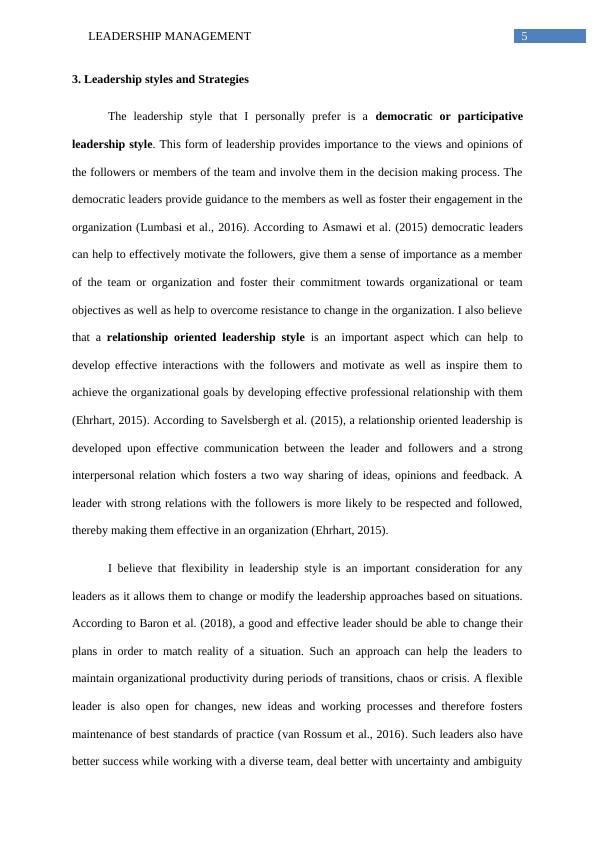
6LEADERSHIP MANAGEMENT
in a better way (Baron et al., 2018). A democratic and participatory leadership also helps to
implement flexibility in the leadership style by involving the members and their views and
opinions in the decision making process, improve preparedness for changes and new ideas
(Ehrhart, 2015). A relationship oriented leadership style also involves flexibility of the leader
as they have to develop an effective interpersonal relation with each member of the team,
often having to cross cultural barriers to communication (Savelsbergh et al.). Logrippo et al.
(2018) suggested that flexibility can help leaders to overcome challenging situations by
learning from the situations and implementing strategies to overcome or address them.
Flexibility also allows leaders to use different leadership styles based on the situation and
context and therefore ensure better chances of success (van Rossum et al., 2016). Burbank
(2018) further pointed out that flexibility also helps leaders to adapt to new situations,
circumstances and plans and thus maintain organizational performance. The Jung Typology
test showed that I have an EFNP personality exhibited by 94% Extraversion, 56%
Intuitiveness, 34% Feelings and 6% Perceptiveness. The score show that I prefer intuition
over sensing and feeling over thinking about situations which requires flexibility to assess
different situations (humanmetrics.com, 2019; Furnham, 2018). The Gallup Strengths Test
showed that my key strengths included problem solving (100%), Faith (94%),
Communication (94%), Innovation (94%) and visionary (88%). These scores support
flexibility in my professional work, helping me to solve various organizational problems,
innovate new ideas, use communication in an appropriate manner and lead people towards a
common vision (Busch et al., 2018).
I believe that motivation is an integral part of democratic leadership since it involves
involving people in the decision making process and orienting them towards organizational
goals and objectives. One of the biggest characteristics of a democratic and relation
based ;leadership styles is the presence of an effective communication between the leaders
in a better way (Baron et al., 2018). A democratic and participatory leadership also helps to
implement flexibility in the leadership style by involving the members and their views and
opinions in the decision making process, improve preparedness for changes and new ideas
(Ehrhart, 2015). A relationship oriented leadership style also involves flexibility of the leader
as they have to develop an effective interpersonal relation with each member of the team,
often having to cross cultural barriers to communication (Savelsbergh et al.). Logrippo et al.
(2018) suggested that flexibility can help leaders to overcome challenging situations by
learning from the situations and implementing strategies to overcome or address them.
Flexibility also allows leaders to use different leadership styles based on the situation and
context and therefore ensure better chances of success (van Rossum et al., 2016). Burbank
(2018) further pointed out that flexibility also helps leaders to adapt to new situations,
circumstances and plans and thus maintain organizational performance. The Jung Typology
test showed that I have an EFNP personality exhibited by 94% Extraversion, 56%
Intuitiveness, 34% Feelings and 6% Perceptiveness. The score show that I prefer intuition
over sensing and feeling over thinking about situations which requires flexibility to assess
different situations (humanmetrics.com, 2019; Furnham, 2018). The Gallup Strengths Test
showed that my key strengths included problem solving (100%), Faith (94%),
Communication (94%), Innovation (94%) and visionary (88%). These scores support
flexibility in my professional work, helping me to solve various organizational problems,
innovate new ideas, use communication in an appropriate manner and lead people towards a
common vision (Busch et al., 2018).
I believe that motivation is an integral part of democratic leadership since it involves
involving people in the decision making process and orienting them towards organizational
goals and objectives. One of the biggest characteristics of a democratic and relation
based ;leadership styles is the presence of an effective communication between the leaders
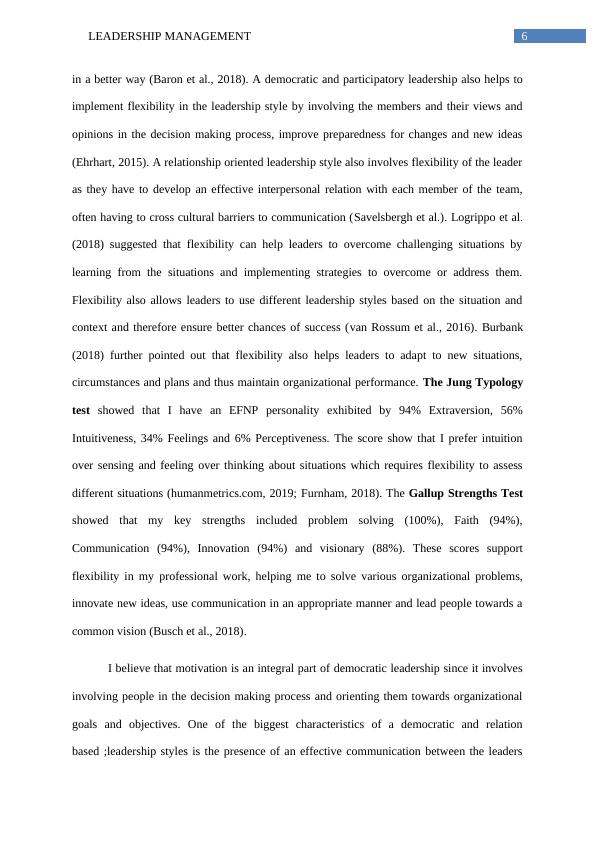
7LEADERSHIP MANAGEMENT
and followers where the views, opinions and feedbacks are shared both ways which
influences the decision making processes (Lumbasi et al., 2016). According to Asmawi et al.
(2015), involvement of the members in decision making process and valuing their
participation helps to instill a sense of belonging and loyalty to the organization and thus
motivate them to work towards organizational objectives. I also feel that motivating the
employee is vital to retain their loyalty and maintain quality and standards of practice. By
motivating the members in the right way, it can be possible to improve their performance,
foster job satisfaction, retain skilled employees, and overcome resistance to change and foster
better employee engagement in the organization (Lumbasi et al., 2016). Both the Gallup test
and Jung Typology test showed that I have strong abilities to motivate people in order to lead
them in an effective manner. The skills to motivate people was also shown in the Leadership
Self Assessment test which showed by competencies in communication and feedback,
leadership styles, motivating people, maintaining organizational culture, use performance
based management strategies and foster trust and fairness in my leadership approach
(business.govt.nz, 2019; Thompson & Glasø, 2018). According to Furnham (2018), these
values can significantly help to motivate people towards organizational objectives.
and followers where the views, opinions and feedbacks are shared both ways which
influences the decision making processes (Lumbasi et al., 2016). According to Asmawi et al.
(2015), involvement of the members in decision making process and valuing their
participation helps to instill a sense of belonging and loyalty to the organization and thus
motivate them to work towards organizational objectives. I also feel that motivating the
employee is vital to retain their loyalty and maintain quality and standards of practice. By
motivating the members in the right way, it can be possible to improve their performance,
foster job satisfaction, retain skilled employees, and overcome resistance to change and foster
better employee engagement in the organization (Lumbasi et al., 2016). Both the Gallup test
and Jung Typology test showed that I have strong abilities to motivate people in order to lead
them in an effective manner. The skills to motivate people was also shown in the Leadership
Self Assessment test which showed by competencies in communication and feedback,
leadership styles, motivating people, maintaining organizational culture, use performance
based management strategies and foster trust and fairness in my leadership approach
(business.govt.nz, 2019; Thompson & Glasø, 2018). According to Furnham (2018), these
values can significantly help to motivate people towards organizational objectives.
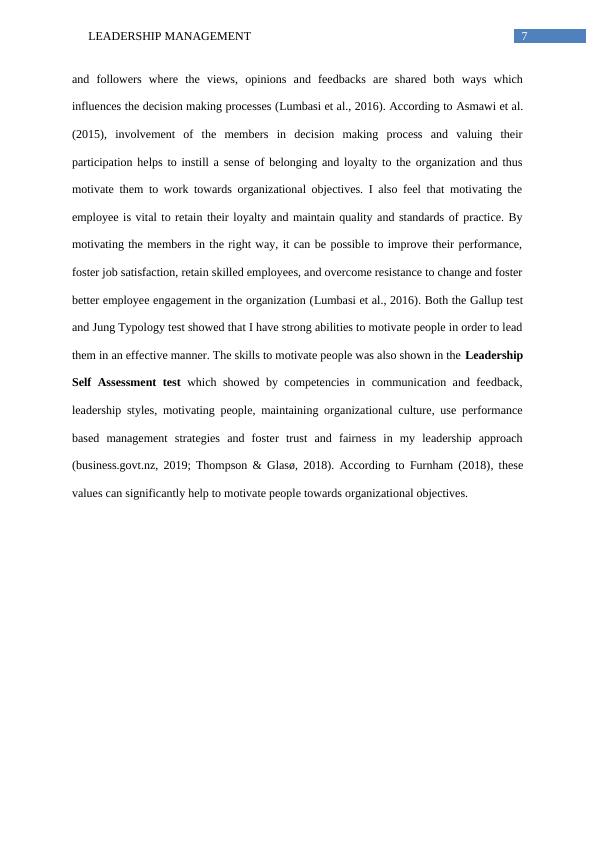
End of preview
Want to access all the pages? Upload your documents or become a member.
Related Documents
Preparing For Professional Transitionslg...
|5
|1066
|193
Exploring Leadership Qualities and Abilities in Nursing Aspirantslg...
|14
|3924
|466
SWOT Analysis Nursing Leadership Example Assignment for Studentslg...
|7
|1214
|8250
Cover Letter for Nursing Position - Lajuanna Barnettlg...
|4
|611
|373
Leadership and Management in Nursing: Communication Skills, Mentoring, and Challenges with Electronic Health Recordslg...
|8
|3067
|175
CURRICULUM VITAElg...
|4
|446
|78
